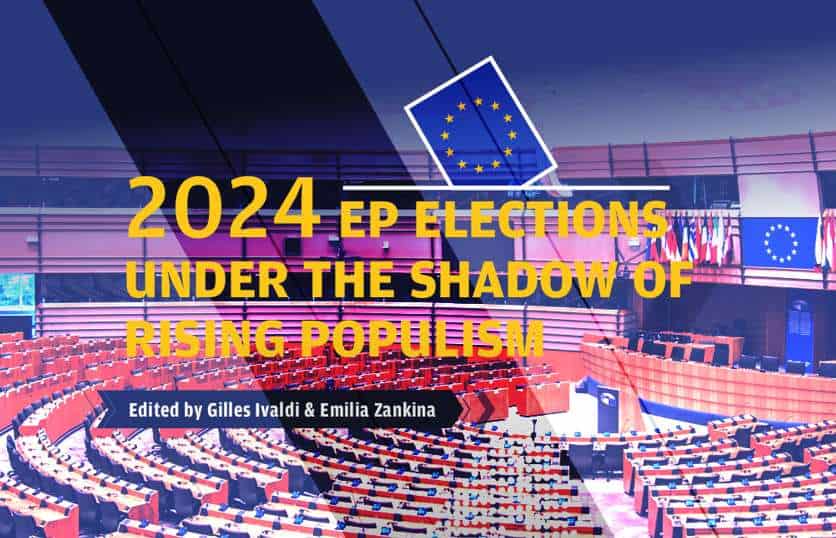After the 2019 Green wave, many observers expected a blue-brownish backlash for 2024. And in many countries, these observers (who are these people, and why are they always so well-informed?) were not disappointed.
In Germany, the governing “progressive” coalition took a rather spectacular beating, while the main opposition, the Christian Democrats (CDU/CSU) performed ok-ish. The real winners, of course, were the radical right-wing populist Alternative for Germany (AfD) and the new left-wing national-populist Bündnis Sahra Wagenknecht (BSW).
- Arzheimer, Kai. “Germany’s 2024 EP Elections: The Populist Challenge to the Progressive Coalition.” 2024 EP Elections under the Shadow of Rising Populism. Eds. Ivaldi, Gilles and Emilia Zankina. Brussels: European Center for Populism Studies (ECPS), 2024. 179-191. doi:10.55271/rp0071
[BibTeX] [Abstract] [HTML]The 2024 European parliamentary election in Germany marked a significant shift in the political landscape, with devastating results for the governing coalition of the Social Democrats (SPD), the Greens, and the Liberal Democrats (FDP). Chancellor Scholz’s SPD and the Greens experienced substantial losses, while the opposition Christian Democrats (CDU/CSU) saw a modest increase in their vote share. The most notable gains were made by the populist radical-right Alternative for Germany (AfD) and the newly formed left-wing populist Sahra Wagenknecht Alliance (BSW), a breakaway from the Left (Die Linke), highlighting a growing demand for populist politics in Germany. The Left itself suffered heavy losses. Despite internal scandals and controversies that contributed to a considerable drop in support in pre-election polls, the AfD leveraged anti-immigration sentiments and economic concerns to gain substantial support. The BSW capitalized on left-authoritarian positions, emphasizing welfare and antiimmigration policies. Both parties also criticized Germany’s support for Ukraine and styled themselves as agents of ‘peace’. The election results underscored the unpopularity of the ‘progressive coalition’ in Germany and reflected the impact of high inflation, energy security concerns and contentious climate policies on voter behaviour. Voter turnout was the highest since 1979, indicating heightened political engagement. Like in previous elections, populist parties were much more successful in the post-communist eastern states. While its impact on the European level is limited, the election sent shock waves through Germany, suggesting a shift in future policy directions, particularly concerning the green transformation and relations with Russia.
@InCollection{arzheimer-2024c, author = {Arzheimer, Kai}, title = {Germany's 2024 EP Elections: The Populist Challenge to the Progressive Coalition}, booktitle = {2024 EP Elections under the Shadow of Rising Populism}, publisher = {European Center for Populism Studies (ECPS)}, year = 2024, editor = {Ivaldi, Gilles and Zankina, Emilia}, pages = {179-191}, address = {Brussels}, dateadded = {07-03-2023}, abstract = {The 2024 European parliamentary election in Germany marked a significant shift in the political landscape, with devastating results for the governing coalition of the Social Democrats (SPD), the Greens, and the Liberal Democrats (FDP). Chancellor Scholz's SPD and the Greens experienced substantial losses, while the opposition Christian Democrats (CDU/CSU) saw a modest increase in their vote share. The most notable gains were made by the populist radical-right Alternative for Germany (AfD) and the newly formed left-wing populist Sahra Wagenknecht Alliance (BSW), a breakaway from the Left (Die Linke), highlighting a growing demand for populist politics in Germany. The Left itself suffered heavy losses. Despite internal scandals and controversies that contributed to a considerable drop in support in pre-election polls, the AfD leveraged anti-immigration sentiments and economic concerns to gain substantial support. The BSW capitalized on left-authoritarian positions, emphasizing welfare and antiimmigration policies. Both parties also criticized Germany's support for Ukraine and styled themselves as agents of 'peace'. The election results underscored the unpopularity of the 'progressive coalition' in Germany and reflected the impact of high inflation, energy security concerns and contentious climate policies on voter behaviour. Voter turnout was the highest since 1979, indicating heightened political engagement. Like in previous elections, populist parties were much more successful in the post-communist eastern states. While its impact on the European level is limited, the election sent shock waves through Germany, suggesting a shift in future policy directions, particularly concerning the green transformation and relations with Russia.}, pdf = {https://www.populismstudies.org/wp-content/uploads/2024/10/DOWNLOAD-REPORT-ON-GERMANY.pdf}, html = {https://www.populismstudies.org/germanys-2024-ep-elections-the-populist-challenge-to-the-progressive-coalition/}, doi = {10.55271/rp0071} }
If you want to know how exactly Germany ended up with this train wreck of an election and what it means for the future, look no further: here is my chapter that puts the EP 2024 result in Germany into context – free for you to read, download, yodel etc.
However, the story is not all doom and gloom across Europe (or at least it’s different shades of gloom), and it gets better: mine is just one of 26 chapters in this excellent open access volume that covers the 2024 European elections in most member states. Yes, most, because they left one out. Now go through the volume to find out which one it is. It’s all good stuff.




Reposts
Likes